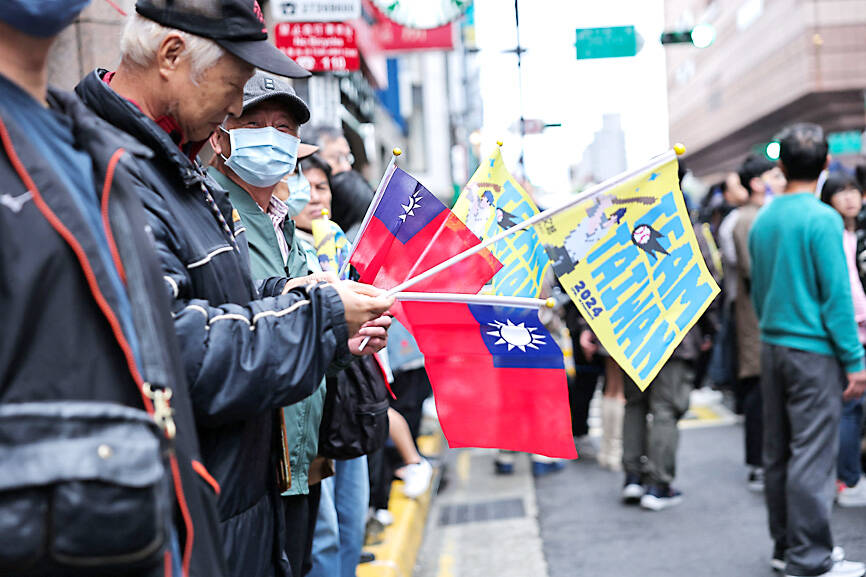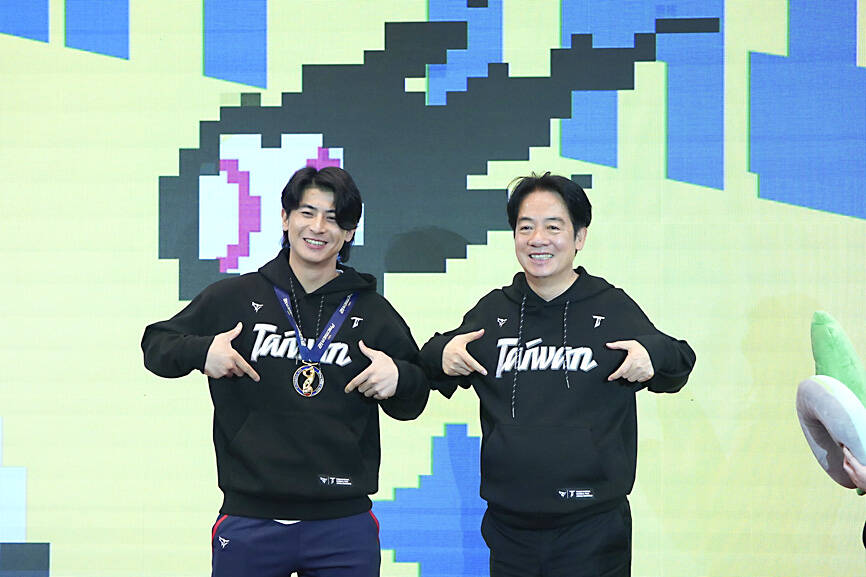Lawmakers yesterday proposed designating Nov. 24 as National Baseball Day and updating the design of the NT$500 bill to honor the national team’s victory in the World Baseball Softball Confederation’s Premier12 championship on Sunday, as thousands of fans came out to see the players parade down the streets of Taipei.
Players, coaches and staff from the national team returned home on Monday night after achieving their best-ever performance in an international baseball tournament.
After receiving a rapturous welcome at the airport, the players turned out yesterday for a street parade in front of thousands of adoring fans waving Taiwanese flags and “Team Taiwan” signs.

Photo: CNA
Employees of a bank climbed out of their first-floor office windows to watch the players go past.
“I couldn’t sleep for two nights, that shows how excited I am,” Victor Chai, 30, said as he stood in the crowd. “I’ve been watching games for 20 years, and I never thought I’d see the day when Taiwan’s team would win an international championship.”
After playing under the name “Chinese Taipei,” the team wore black hoodies emblazoned with “Taiwan” as they stood in the back of military jeeps and trucks.

Photo: Ann Wang, Reuters
The parade ended at the Presidential Office Building, where the team were greeted by President William Lai (賴清德) and Vice President Hsiao Bi-khim (蕭美琴) wearing the same hoodies as the players.
“Thank you for showing Taiwan to the world,” Lai told the players. “Taiwan is not just about semiconductors; Taiwan also has baseball.”
Meanwhile, in the legislature, a bill to make Nov. 24 National Baseball Day was proposed by Democratic Progressive Party (DPP) Legislator Hsu Chih-chieh (許智傑) and cosponsored by 26 of his DPP colleagues.

Photo: CNA
“Taiwan won the Premier12 championship. The first thought that came into my mind was to propose making Nov. 24 National Baseball Day,” Hsu told reporters.
However, the day would resemble a memorial day, such as National Hakka Day on Dec. 28 or National Migrants Day on Dec. 18, rather than a national holiday, he added.
The day would serve to remind people of the historic triumph and raise awareness of sports development in Taiwan, Hsu said, adding that the purpose of the bill has nothing to do with creating a new national holiday.
Lai was also reported to have proposed changing the portrait on the NT$500 bill from that of baseball players of Taitung County Nan Wang Elementary School to that of the national baseball team in the Premier12, which was endorsed by DPP lawmakers.
The central bank said it would cautiously assess the proposal.
Chinese Nationalist Party (KMT) Legislator Jessica Chen (陳玉珍) said Hsu’s proposal needs further deliberation.
“Badminton players Lee Yang (李洋) and Wang Chi-ling (王齊麟) are two-time Olympic gold medalists. Should there not be a National Badminton Day as well?” Chen asked.
Instead of NT$500 banknotes, the portrait on the NT$1,000 banknote could be changed to feature players on the Premier12 championship team, Chen said.
KMT Legislator Hung Meng-kai (洪孟楷) said that changing the banknotes might require more detailed discussions and planning, but what the central bank can do now is issue commemorative coins or banknotes in accordance with the Regulations Governing the Issuance of Gold and Silver Coins and Commemorative Notes and Coins (金銀幣及紀念性券幣發行辦法).
DPP Legislator Tsai Chi-chang (蔡其昌), who also serves as the Chinese Professional Baseball League (CPBL) commissioner, called for legislative support for the budget allocated for sports development to ensure there is sufficient funding for the national baseball team when they compete in the World Baseball Classic qualifiers in February.
Opposition lawmakers have been blocking the review of the proposed general budget.
“The championship title that touched us all was only made possible because of funding approved by the legislature, players’ fighting spirit and collective support of baseball fans,” Tsai said.
“I hope that lawmakers across party lines would think about this touching moment,” he said.
Part of the budget to be allocated to the national baseball team is to fund information-gathering operatives for baseball players competing in Premier12 championship, which many experts have credited as an important factor contributing to their unprecedented success, he said.
As 14 of the 28 players on the team are indigenous, the Council of Indigenous Peoples said it would host a banquet for them and pledged to budget NT$200 million (US$6.15 million) next year to cultivate indigenous athletes.
Chunghwa Post has plans to issue commemorative stamps for the Premier12 championship, Minister of Transportation and Communications Chen Shih-kai (陳世凱) said.
Additional reporting by AFP

Right-wing political scientist Laura Fernandez on Sunday won Costa Rica’s presidential election by a landslide, after promising to crack down on rising violence linked to the cocaine trade. Fernandez’s nearest rival, economist Alvaro Ramos, conceded defeat as results showed the ruling party far exceeding the threshold of 40 percent needed to avoid a runoff. With 94 percent of polling stations counted, the political heir of outgoing Costa Rican President Rodrigo Chaves had captured 48.3 percent of the vote compared with Ramos’ 33.4 percent, the Supreme Electoral Tribunal said. As soon as the first results were announced, members of Fernandez’s Sovereign People’s Party

EMERGING FIELDS: The Chinese president said that the two countries would explore cooperation in green technology, the digital economy and artificial intelligence Chinese President Xi Jinping (習近平) yesterday called for an “equal and orderly multipolar world” in the face of “unilateral bullying,” in an apparent jab at the US. Xi was speaking during talks in Beijing with Uruguayan President Yamandu Orsi, the first South American leader to visit China since US special forces captured then-Venezuelan president Nicolas Maduro last month — an operation that Beijing condemned as a violation of sovereignty. Orsi follows a slew of leaders to have visited China seeking to boost ties with the world’s second-largest economy to hedge against US President Donald Trump’s increasingly unpredictable administration. “The international situation is fraught

MORE RESPONSIBILITY: Draftees would be expected to fight alongside professional soldiers, likely requiring the transformation of some training brigades into combat units The armed forces are to start incorporating new conscripts into combined arms brigades this year to enhance combat readiness, the Executive Yuan’s latest policy report said. The new policy would affect Taiwanese men entering the military for their compulsory service, which was extended to one year under reforms by then-president Tsai Ing-wen (蔡英文) in 2022. The conscripts would be trained to operate machine guns, uncrewed aerial vehicles, anti-tank guided missile launchers and Stinger air defense systems, the report said, adding that the basic training would be lengthened to eight weeks. After basic training, conscripts would be sorted into infantry battalions that would take

GROWING AMBITIONS: The scale and tempo of the operations show that the Strait has become the core theater for China to expand its security interests, the report said Chinese military aircraft incursions around Taiwan have surged nearly 15-fold over the past five years, according to a report released yesterday by the Democratic Progressive Party’s (DPP) Department of China Affairs. Sorties in the Taiwan Strait were previously irregular, totaling 380 in 2020, but have since evolved into routine operations, the report showed. “This demonstrates that the Taiwan Strait has become both the starting point and testing ground for Beijing’s expansionist ambitions,” it said. Driven by military expansionism, China is systematically pursuing actions aimed at altering the regional “status quo,” the department said, adding that Taiwan represents the most critical link in China’s